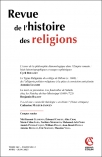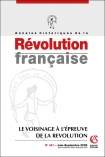
Revue de l'histoire des religions (1/2016)
Pour acheter ce numéro, contactez-nous
Recevez les numéros de l'année en cours et accédez à l'intégralité des articles en ligne.
L’apocalyptique est une catégorie d’interprétation utilisée dans le débat du xxe siècle sur le sens de la politique et de l’histoire après la Shoa, le totalitarisme et la domination planétaire du marché mondial. Le rôle de la religion chrétienne dans le développement de la politique occidentale est au centre de ce débat – depuis la théologie politique de Schmitt et Taubes jusqu’à la philosophie de l’histoire de Löwith et Kojève et au « pouvoir pastoral » et « gouvernemental » de Foucault. Mais l’intérêt évident des premiers auteurs pour l’apocalyptique s’oppose à la présence limitée de cette question dans les études de Foucault. L’objectif de cet article est de comprendre ces différentes positions, en essayant de définir la pertinence du christianisme dans une analyse de l’époque actuelle.
Apocalyptics is an interpretative category used in the early 20th C in the debate surrounding the meaning of history and politics following the Shoah, totalitarianism and the planetary domination of the world market. The role of the Christian religion in the development of Western politics was at the core of this debate – which ranged from the political theology of Schmitt and Taubes to the philosophy of history according to Löwith and Kojève and to Foucault’s “pastoral power” and “governmental power”. However, the obvious interest of the first of these authors in apocalyptics contrasts with the limited presence of the issue in Foucault’s studies. The object of this article is to understand these different positions by attempting to define the pertinence of Christianity within an analysis of the current age.

